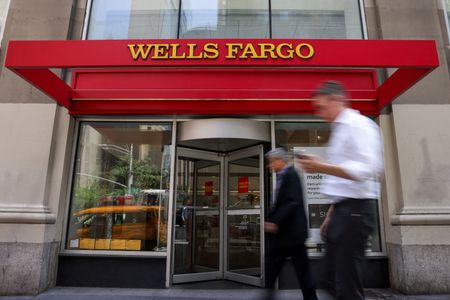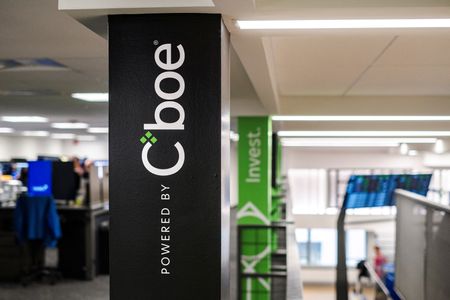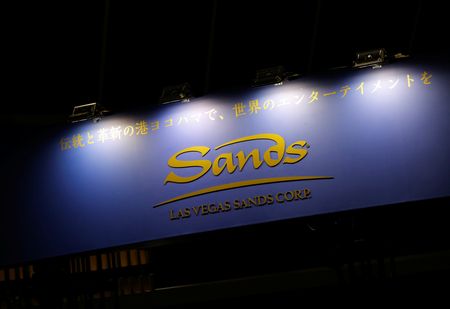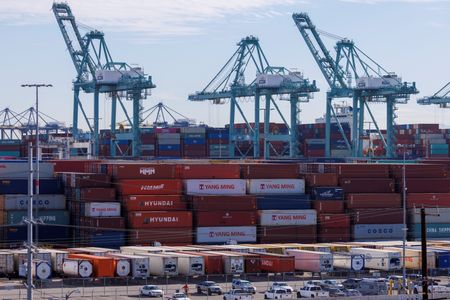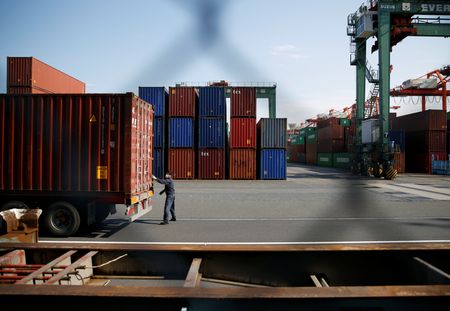By Liz Lee, Lananh Nguyen and Nupur Anand
BEIJING/NEW YORK (Reuters) -China’s Foreign Ministry said on Monday that Chenyue Mao, the Wells Fargo banker who has been blocked from leaving the country, was involved in a criminal case and obliged to cooperate with the investigation.
Mao is the latest of several executives from foreign corporations to be stopped as they tried to depart China. Her exit ban comes at a tense moment in U.S.-China relations as the two countries wrangle over trade policies.
Chinese law enforcement authorities have restricted Mao’s exit in accordance with the law, Guo Jiakun, a spokesperson for the ministry, told a regular press briefing.
Wells Fargo declined to comment. On Friday, the bank said it was “working through the appropriate channels” to secure Mao’s return to the United States as soon as possible.
The U.S. bank suspended all travel to China after Mao’s exit ban, a person familiar with the matter told Reuters last week, saying she was a U.S. citizen. It is not known exactly when the ban was imposed.
The case was being investigated and Mao was obliged to cooperate with the investigation, Guo said, without elaborating.
“Everyone in China, whether they are Chinese or foreigners, must abide by Chinese laws,” Guo said, adding that China will protect their legitimate rights and interests in investigations.
Beijing has used exit bans on both Chinese and foreign nationals, often in connection with civil disputes, regulatory investigations, or criminal investigations. Reuters could not determine whether Mao had surrendered her Chinese citizenship.
The exit ban marks a stark contrast from three weeks ago, when Mao stood on stage in Rio de Janeiro flanked by industry executives. She had just been elected chair of FCI, a group that facilitates international trade through factoring, a process in cross-border transactions that involves financing, invoicing, and payments.
“I am excited for what lies ahead … together we will go far,” Mao posted on LinkedIn. She later travelled to China, where she was born, and was blocked by authorities from returning to Alpharetta, Georgia.
The Shanghai-born managing director and Wells Fargo are awaiting more information, according to two sources familiar with the situation who declined to be identified given the sensitivity of the matter.
The bank is seeking more information through various channels, but is trying to keep a low profile to avoid escalating the situation, according to the sources.
Mao’s exit ban comes as diplomatic and business ties between the U.S. and China remain strained. Experts said it could halt corporate travel to mainland China, especially by Chinese-born people holding foreign passports.
Mao has been a banker at Wells Fargo for over a decade, and works in its international factoring business, according to her LinkedIn profile.
Factoring is a financing method in which companies sell their receivables to third parties, such as banks, in exchange for immediate cash, and advises multinational clients on cross-border working-capital strategies.
FCI has 48 members in China that account for nearly 13% of its membership, according to the group’s website. In total, it has nearly 400 member companies in more than 90 countries.
FCI did not respond to requests for comment.
At Mao’s house, about an hour north of Atlanta, no one appeared to be home on Friday evening. Neighbours declined to comment to Reuters.
The home is in the Nesbit Lakes neighbourhood, which shoulders narrow, winding roads. The upscale houses have manicured lawns and large oak trees that surround a small lake near the Chattahoochee River in Atlanta’s northern suburb.
The area’s median home price is just over $1.17 million.
EXIT BANS
Wells Fargo’s China business is much smaller than its Wall Street peers, with branches in Beijing and Shanghai.
Several foreign executives have been caught up in probes by authorities that have chilled business sentiment in China.
Two sources who have helped to resolve exit bans in the past said they are often issued by local Chinese governments. Such bans can be used to address a range of issues, from business disputes to family conflicts, allegations of illegal conduct or personal altercations, said the sources, who had no specific knowledge of Mao’s case. The two sources declined to be identified because of the sensitivity of the matter.
Factoring typically involves companies sending international invoices internally, and can be complex and sometimes subject to mishandling amid capital controls, the two sources said.
A Chinese-American man who works for the U.S. Commerce Department and traveled to China months ago is also subject to an exit ban after not disclosing his work for the U.S. government, the Washington Post and other outlets have reported. The individual was not named. Reuters could not immediately verify the report.
The U.S. State and Commerce departments did not immediately respond to requests for comment, nor did the Chinese embassy in Washington.
U.S. Secretary of State Marco Rubio said this month there was a high probability of a meeting between the U.S. and Chinese leaders, Donald Trump and Xi Jinping, but that no date has been discussed.
While the use of exit bans, including on foreign nationals, is rising, “too often companies and countries prefer to remain silent in the hopes of improving or accelerating the process,” said Laura Harth, China in the World director of human rights at Safeguard Defenders, a non-profit organization.
“The signal it should send is that no one is safe when travelling to China,” she added.
(Reporting by Liz Lee in Beijing, Lananh Nguyen and Nupur Anand in New York; additional reporting by Rich McKay, Trevor Hunnicutt, Karen Freifeld, Daphne Psaledakis and Koh Gui Qing, writing by Scott Murdoch and Beijing Newsroom; Editing by Muralikumar Anantharaman and Kate Mayberry, Sumeet Chatterjee, Megan Davies, Rod Nickel)

